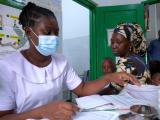May 7, 2010 (CIDRAP News) Merck, the company that makes the most commonly given rotavirus vaccine in the United States, yesterday said it has detected very low levels of DNA from porcine circovirus (PCV) in its Rotateq vaccine, making it the second rotavirus vaccine found to contain PCV.
The company said in a press release that it used highly sensitive assays to test its vaccine after an independent testing laboratory found evidence of the virus in the other US-licensed rotavirus vaccine, Rotarix, made by GlaxoSmithKline (GSK).
On Mar 22 the US Food and Drug Administration (FDA) recommended that, although it doesn't appear that the Rotarix poses any safety risks, physicians should suspend administering it until government and industry scientists could review the findings.
The FDA's vaccine advisory panel was scheduled to discuss the Rotarix findings today, and yesterday in advance of the meeting it posted a notice on Merck's PCV findings for its vaccine. It said preliminary studies from Merck had identified DNA fragments from PCV subtype 1 (PCV1), the same subtype found in GSK's vaccine, as well as from PCV subtype 2 (PCV2).
The FDA said neither has been known to cause illness in humans, though PCV2 can cause illness in pigs. It also said it has no evidence that either of the vaccines poses a safety risk and that both have strong safety records.
At today's meeting of the FDA Vaccine and Related Biological Products Advisory Committee (VRBPAC), members were briefed on the latest study findings from FDA and industry scientists. Most members said the benefits of the rotavirus vaccines clearly outweigh the risks, though several expressed concerns about the PCV2 findings in Merck's vaccine, due to the fact that it can cause disease in pigs.
Yesterday the Centers for Disease Control and Prevention (CDC) reported that the last two rotavirus seasons were shorter than past seasons and that vaccine coverage has risen to 72%. However, usage is about 13% lower than two other childhood vaccines commonly given to infants. The CDC findings appear in the latest issue of Morbidity and Mortality Weekly Report (MMWR).
Some VRBPAC members today voiced a need for transparency when talking to parents about the rotavirus vaccine PCV findings, but they also worried that news about contamination with extraneous virus fragments could erode some of the gains in vaccine coverage.
See also:
May 6 FDA VRBPAC committee background materials
May 7 MMWR report




















